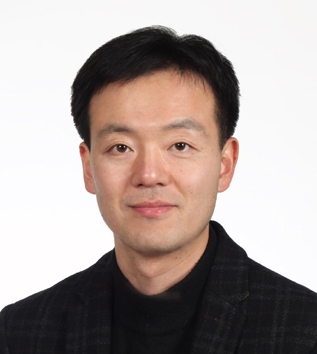소개

Prof.신재혁
Tel:02-3290-2197
E-mail:shinj@korea.ac.kr
- About Professor
- Curriculum Vitae
- Publication
- Research
- Teaching
- Lab Members
-
Profile
Welcome to my web page. I am an assistant professor of political science & international relations at Korea University. I received my Ph.D. in 2011 from the Department of Political Science at UCLA. My primary interests lie in political institutions, elections, parties, and legislative politics in new democracies, especially in East and Southeast Asia -- Indonesia, the Philippines, Thailand, Taiwan, and South Korea. My current book project, entitled Electoral System Choice and Personalistic Parties in New Democracies, examines the reasons for differences in electoral institutions and party development in new democracies. I investigate why, in periods of transition to democracy, political leaders sometimes choose candidate-centered electoral rules, which tend to foster personalistic parties, undermining party discipline and loyalty and spurring pork barrel politics. To address that question, I examine three new democracies in Asia -- the Philippines, Indonesia, and South Korea -- and test the general applicability of the findings using a larger dataset of emerging democracies. Other research interests include redistributive politics, executive-legislative relations, and political and economic development. For more information about my research and to download my cv, please follow the links on the navigation bar.
-
Curriculum Vitae
-
Publications
Articles
- Forthcoming. "The Choice of Candidate-Centered Electoral Systems in New Democracies." Party Politics .
- Forthcoming. "Legislative Voting under Regionalism: An Analysis of Roll-Call Votes in the South Korean National Assembly, 2000-2008." (with Hojun Lee) Government & Opposition .
- 게재 예정 . "공간모형을 이용한 정치현상 분석." 『평화연구』 .
- 2015. "다종족 국가의 갈등 요인과 통합 정책 : 빈곤과 정치적 배제가 종족 갈등에 미치는 영향." 『국제정치논총』 55집 1호, 39-63.
- 2015. "동남아시아 신생민주국가 정당체제 비교 연구 : 선거제도와 정당체제의 파편성 .” 『동남아시아연구』 25권 1호, 1-30.
- 2015. "Voter Demands for Patronage: Evidence from Indonesia." Journal of East Asian Studies 15(1): 127-51.
- 2014. "Executive Strength, Executive-Legislative Relations, and Budget Deficits." (with Hojun Lee) Korean Journal of International Studies 12(2): 451-72.
- 2013. "Voter Demands, Access to Resources, and Party Switching: Evidence from the South Korean National Assembly, 1988-2008." Japanese Journal of Political Science 14(4): 453-72 .
- 2013. "Cabinet Duration in Presidential Democracies." Political Science Quarterly 128(2): 317-39 .
- 2011. "The Choice of Electoral Systems in New Democracies: A Case Study of South Korea in 1988." Democratization 18(6): 1246-69.
- 2003. "세대정치의 등장과 지역주의." (이내영 공저) 『 아세아연구 』 46권 4호, 283-309.
Book chapter
- 2013. "Electoral System Choice and Parties in New Democracies: Lessons from the Philippines and Indonesia." In Party Politics in Southeast Asia: Clientelism and Electoral Competition in Indonesia, Thailand, and the Philippines , edited by Dirk Tomsa and Andreas Ufen. London, New York: Routledge.
Book review
- 2013. "Electoral System Choice and Parties in New Democracies: Lessons from the Philippines and Indonesia." In Party Politics in Southeast Asia: Clientelism and Electoral Competition in Indonesia, Thailand, and the Philippines , edited by Dirk Tomsa and Andreas Ufen. London, New York: Routledge.
Policy reports
- 2014. “동남아시아 신생민주국가의 선거정치: 필리핀, 인도네시아, 태국 비교." 제주평화연구원 정책포럼.
- 2013. "NAMA-GTC 협력 네트워크 구축 방안에 관한 연구." 한국과학기술연구원 녹색기술센터.
-
Research

Book Project
Electoral System Choice and Personalistic Parties in New Democracies
Why are candidate-centered electoral institutions that foster personalistic parties sometimes chosen in new democracies? Personalistic parties, which are undisciplined and focused on delivering individual or local benefits, are believed to harm government accountability and performance, and hence to weaken citizen support for democracy in the long run. Many scholars argue that these parties thrive because of candidate-centered electoral rules, which encourage candidates to cultivate personal reputations with constituents (instead of party policy reputations). Yet it is seldom obvious why such rules were adopted in the first place. To address this question, I conduct case studies of three Asian new democracies—the Philippines, Indonesia, and South Korea—and reveal that political leaders in new democracies sometimes choose candidate-centered electoral institutions in order to increase their electoral chances in the upcoming first democratic election, even though such institutions may harm their long-term interests. Social contexts and institutional settings affect which institutional choice is likely to help win the first election. I then corroborate those hypotheses drawn from the case study findings with cross-national quantitative studies of 97 new democracies since 1950. Finally, I test within the Asian countries whether candidate-centered electoral institutions chosen during earlier democratization spur personalistic parties by undermining party discipline and loyalty.Broad Research Interests
East and Southeast Asian politics; developing democracies; electoral systems; parties; legislative politics; redistributive politics; executive-legislative relations; political and economic development
Working Papers
- "Legislative Voting in the Pork-Dominant Parliament: Evidence from the Philippine House of Representatives, 1987-2007."
- "Electoral Continuity and Change in South Korea, 1992-2012." (with Suk Jae Hur)
- "Government Partisanship and Technical Disasters." (with Sungwoo Lee and Gyujung Lee)*
- "Voter Demands, Access to Resources, and Electoral Reforms in Indonesia."
- "State Vulnerability and Crony Capitalism: A Comparative Study of Park Jung-hee and Ferdinand Marcos."*
-
Teaching
준비 중입니다.
-
Lab Members
준비 중입니다.
